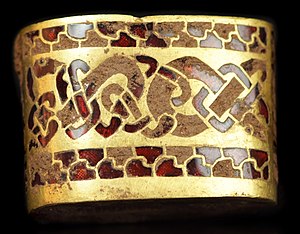Terry Herbert

|
|
 |
|
| Material |
|
|---|---|
| Size | over 3,500 items |
| Writing | Latin |
| Created | c. 7th to 8th centuries |
| Discovered | 2009 Hammerwich near Lichfield, Staffordshire, England 52°39′19″N 1°54′24″W / 52.65528°N 1.90667°WCoordinates: 52°39′19″N 1°54′24″W / 52.65528°N 1.90667°W |
| Discovered by | Terry Herbert |
| Present location | |
The Staffordshire Hoard is the largest hoard of Anglo-Saxon gold and silver metalwork yet found[update]. It consists of over 3,500 items, amounting to a total of 5.1 kg (11 lb) of gold, 1.4 kg (3 lb) of silver and some 3,500 pieces of garnet cloisonné jewellery.
The hoard was most likely deposited in the 7th century, and contains artefacts probably manufactured during the 6th and 7th centuries. It was discovered in 2009 in a field near the village of Hammerwich, near Lichfield, in Staffordshire, England. The location was in the Anglo-Saxon kingdom of Mercia at the time of the hoard's deposition.
The hoard is of considerable importance in Anglo-Saxon archaeology. The artefacts are nearly all martial in character and contains no objects specific to female uses. The average quality of the workmanship is extremely high and especially remarkable in view of the large number of individual objects, such as swords and a helmet, from which the elements in the hoard came.
The hoard was purchased jointly by the Birmingham Museum and Art Gallery and the Potteries Museum & Art Gallery for £3.285 million under the Treasure Act 1996.
The hoard consists of approximately 3,500 pieces, comprising up to 5.094 kg (11.23 lb) of gold and 1.442 kg (3.18 lb) of silver, and is the largest treasure of Anglo-Saxon gold and silver objects discovered to date, eclipsing, at least in quantity, the 1.5 kg (3.3 lb) hoard found in the Sutton Hoo ship burial in 1939.
...
Wikipedia
